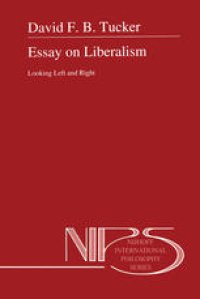
Ebook: Essay on Liberalism: Looking Left and Right
Author: David F. B. Tucker (auth.)
- Tags: Political Philosophy, Philosophy, Modern Philosophy, Philosophy of the Social Sciences
- Series: Nijhoff International Philosophy Series 51
- Year: 1994
- Publisher: Springer Netherlands
- Edition: 1
- Language: English
- pdf
This book offers an introduction to liberal political philosophy, adopting an analytical form of presentation. I consider arguments which inform contemporary debates; by articulating paradigmatic ways of thinking and reviewing competing conceptions of justice and democracy, I hope to present a characterisation of contemporary liberal thought which allows the reader to gauge its potentiality and relevance, and to comprehend in a systematic way some of the many disagreements between liberal writers and the strengths and weaknesses of the claims they make. The reader should also become familiar with the arguments of the most forceful critics of the tradition. The exercise is intended to introduce a way of theorising and my emphasis will be on philosophical analysis and reconstruction. I aim to delineate a variety of intellectual positions in a way that displays their logical coherence. I examine competing conceptions of 'democracy', 'free speech', 'equality' and 'individualism' that inform our political debates in contemporary liberal democracies. These philosophical differences determine many of the policies adopted by governments, for example, whether they forbid racist and pornographic speech, whether they regard abortion as a private matter, whether they oppose efforts to distribute wealth in the name of equity, and what they accept as constituting , due process of law'. By proceeding analytically in the way I propose, we should reach a greater understanding of the disagreements between liberal writers when they make judgments about policy issues of this kind; and we will be better placed to make evaluations.
This book argues that we would be very foolish to abandon the sense of justice that lies at the core of the social democratic approach to political life. The book challenges the view that the liberal tradition is best characterised by its embrace of key values, such as freedom, autonomy, self-realistation, and with the importance accorded to the virtue of tolerance. A competing social democratic/Rawlsian understanding of liberalism is presented and compared with major rival ideological orientations on both the left and the right of the political spectrum.
By reviewing a variety of opinions by writers who are critical of liberalism, as well as debates within the tradition itself, the author shows that: (a) writers to the left of liberalism offer no feasible alternative that offers guidance in dealing with the problems we must face in modern societies; (b) writers to the right on the political spectrum often postulate circumstances in which justice towards individuals need no longer be regarded as an issue. As he shows, both these orientations will lead to a crisis of legitimacy in modern circumstances and this may tempt communities to abandon democracy in order to secure order.
The book may be used in most courses on political philosophy and ideology.